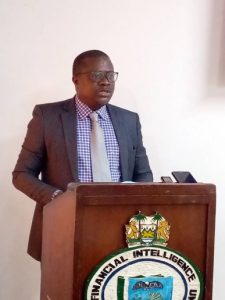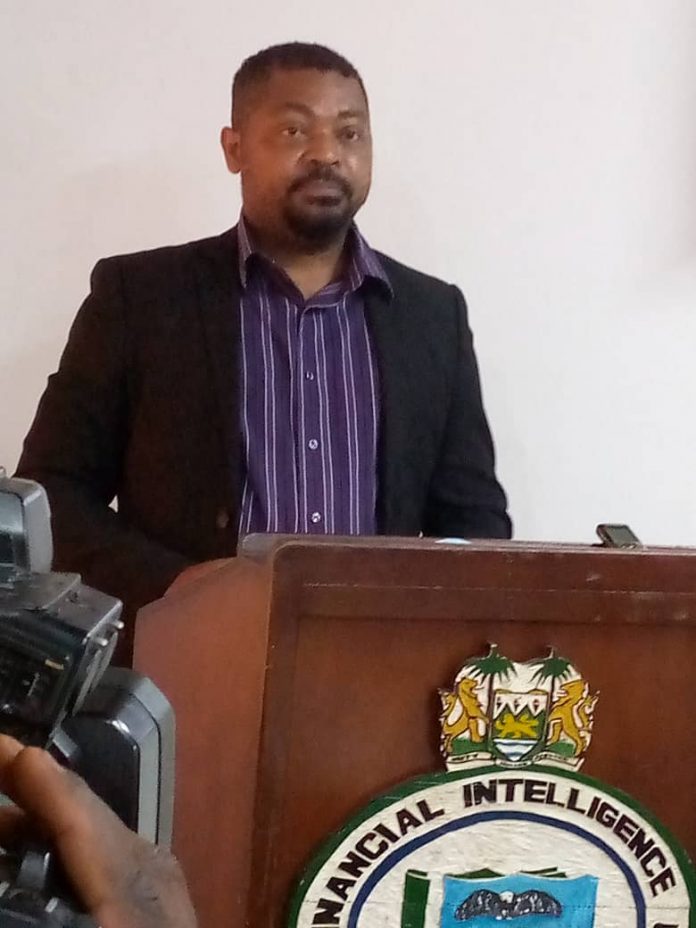By Amin Kef Sesay
In his response to a statement delivered by the Financial Intelligence Unit (FIU), the President of the Sierra Leone Association of Journalists (SLAJ), Ahmed Nasralla, has on the 1st March, 2021 during a Press Conference on the report of the 34th GIABA Technical Mission Plenary, started by thanking the Financial Intelligence Unit (FIU) for inviting him to dilate on issues bordering on money laundering and other related crimes as well as Sierra Leone’s compliance and rating with international standards in combating such.
He said the engagement goes to show that the FIU recognizes the importance of the role of the media in helping to combating money laundering and other financial crimes.
“It was also encouraging to note that two colleagues, Abibatu Kamara and Mohamed Konneh, are the Sierra Leone Media Coordinator and deputy, respectively for The Inter-Governmental Action Group against Money Laundering in West Africa (GIABA),” he continued.
GIABA, it was stated, was established by ECOWAS Authority of Heads of State and Government in 2000 as a major response and contribution of the regional body to the fight against money laundering.
The SLAJ President said it must be accepted that the importance of the media in disseminating information on the one hand, and in exposing corruption generally on the other hand, cannot be overemphasized, especially given that the region is confronted with several threats relating to transnational organized crime with its dramatic negative impact on member countries.
He said most have agreed that as media, journalists’ role in ensuring all organs of society work efficiently in peace and stability is herculean, yet, they are limited in every capacity.
According to him it is against that backdrop that such an engagement with journalists is an opportunity for the FIU to strengthen relationship with the media and improve the capability of journalists to be able to report on money laundering activities and other transnational financial crimes from an informed perspective.
The SLAJ President said to report on issues of money laundering, terrorist financing and other financial crimes and their ramifications, journalist requires not only the knowledge and the tools, but also the virtues of patience, steadfastness and honesty.
Nasralla said it is an area for serious investigative journalists maintaining that investigative journalism is a very demanding type of job.
Of most importance, he pointed out, journalists working on such matters have to cross-check and fact-check every information and document presented to them.
He averred that in this type of work, one don’t have to be in haste to break the news; as one has to take time, gather facts, dig deeper with an open mind and a clear conscience; refrain from accusing someone or an organization wrongly.
The President also stated that it is necessary to be careful with sources and work on building trust and cooperation with potential sources. ‘Take tem kill anch so you go see e gut’, as we say in our local parlance.
He said he understands journalists from Sierra Leone have benefitted from much training to report on such matters, but training has to be continuous in light of emerging trends.
Beyond this, he said, he believes institutions like the FIU must always be forthcoming with the information whenever journalists seek it to aid their investigations.
According to him in a situation where information required by journalists cannot be provided, the FIU must be able to explain to journalists in a respectful manner why this is so. Equally, the FIU (and related anti-graft agencies like the ACC and ASSL) must support freedom of information, access and open data initiatives to help journalists do their work freely.
Moreover, he continued, there should be a comprehensive and complementary approach to the fight against money laundering.
Apart from the media, he said, the FIU also needs to promote strategic partnerships with civil society, religious leaders, youths and relevant State and non-state actors in the fight.
He said SLAJ is pleased to associate with the work of the FIU saying his presence is an indication that they will support their work and continue to work together to fight against the borderless menace.
The Director of the Financial Intelligence Unit, David Borbor, said his institution is responsible for coordinating national effort in the fight against money laundering and terrorist financing.
He noted that Mutual Evaluation is a peer review mechanism adopted by GIABA member States, in accordance with: the Calendar for Mutual Evaluations and the Mutual Evaluations Process and Procedures adopted by the GIABA Ministerial Committee (GMC); the FATF 40 Recommendations; and the FATF Methodology for Assessing Technical Compliance with the FATF Recommendations and the Effectiveness of AML/CFT Systems.
“It is a necessary process to ensure that countries are in compliance with the AML/CFT International standards”, he stated.
According to him Member States of GIABA agree to subject themselves to the assessment process in conformity with international standards for preventing money laundering and financing of terrorism as contained in Articles 12 to 14 of the GIABA Statute.
Thus, within the region, the evaluation is undertaken by the Inter-Governmental action group against Money laundering in West Africa (GIABA) – a specialized institution of ECOWAS and an the FATF -Style regional body, he revealed .
The assessment, he said, comprises two inter-related components one dealing with technical compliance and the other on effectiveness.
The technical compliance assessment, he stated, looks at whether countries have implemented the specific requirements of the FATF Recommendations.
“It looks at detailed issues of law and regulation, and at the very specific requirements that are set out in the FATF standard while the effectiveness assess the extent to which a country achieves a defined set of outcomes that are central to a robust AML/CFT system, and the extent to which a country’s legal and institutional framework is producing the expected results,” he said.





